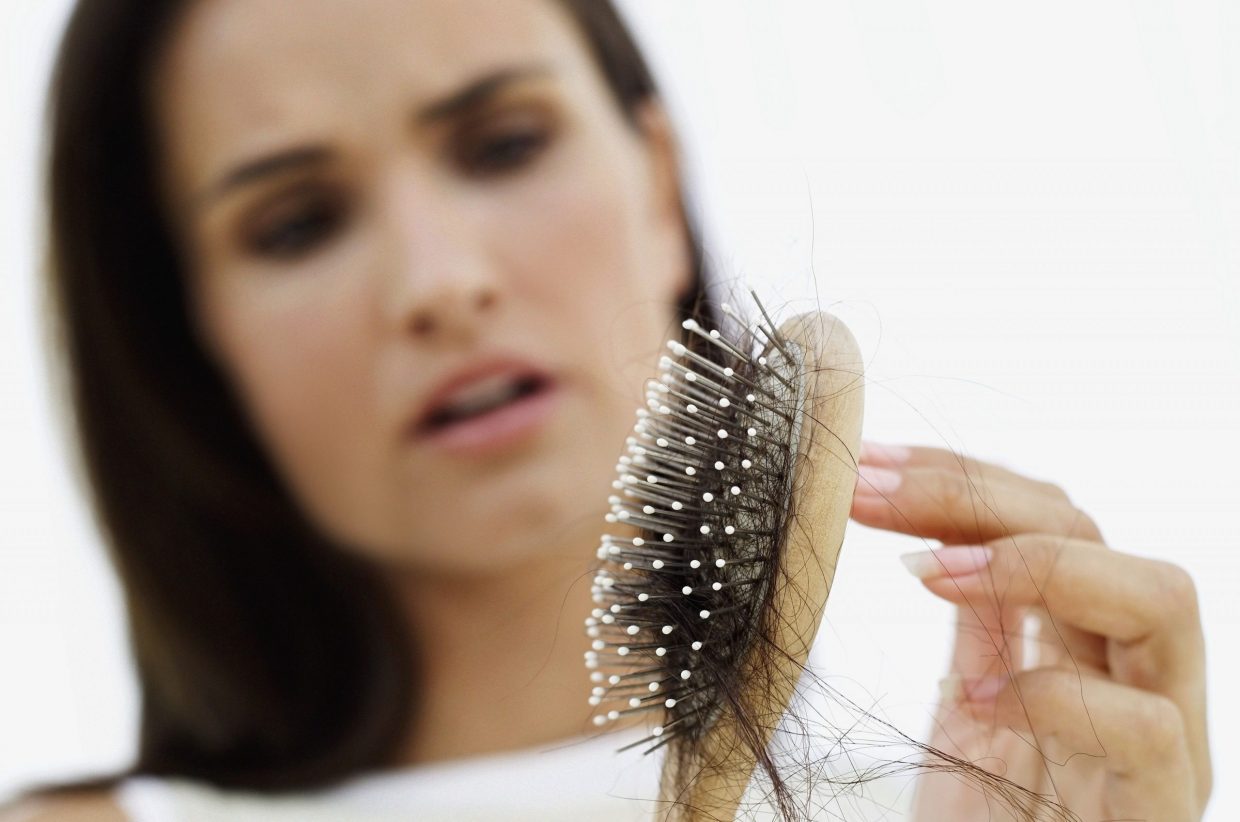Hair falling out without a reason can be worrying, even scary. Most people will lose about a hundred hairs a day as part of the natural hair growth cycle. However, anything above this and you may be dealing with a problem. Hair is affected by a variety of factors, both internal and external, and in many cases, the issue can be stopped and even reversed if the hair follicles are still healthy. Knowing the reasons behind the hair loss is the first step towards finding a solution.
Table of Contents
Some Common Reasons for the Problem
Is It Shedding or Breakage?
First, it is important to check whether your hair is falling out or it’s just breaking due to traction and damage. For example, treating your hair with harsh chemicals or brushing too enthusiastically can cause breakage. Look at the hairs in your brush and check whether they have the little bulb at the end attached. If most of your lost hairs don’t seem to have a root, then you may be dealing with a breakage issue instead. You can read more about how to fix weak hair that breaks here.
After Pregnancy
For women, pregnancy and birth can also cause changes in the way the hair cycle runs. Pregnant women usually have amazing hair because the growth has all but stalled as the body concentrates on nurturing the baby and shuts down non-essential processes. Since there is no Anagen phase, the follicle doesn’t push hair out, preventing shedding. However, once the baby arrives, the process resumes, and shedding often begins drastically between 6 weeks and 3 months after birth. Couple that with stress caused by caring for a new baby and possible iron deficiencies, and you may have a very worried new mom wondering why all her hair is falling out suddenly.
Hormonal and Genetic Causes
As we grow older, hormonal reasons can cause more hairs to enter the telogen stage and not go back into the active growth phase. This is, to a point, largely mandated by genetic reasons, and there is little you can do about it. However, in certain extreme cases, the doctor can offer medication. If it worries you (or androgenetic alopecia runs in your family), a consultation with a trichologist or hair doctor may be just the solution to try and slow the process. Medicines such as minoxidil or finasteride (you may know them as Rogaine or Propecia) are prescribed to treat this sort of genetically inherited problem and can slow it down.
Stress, Anxiety, and Shedding
Stress can cause shedding in all genders, but it’s not usually immediate. After a very stressful period, you may notice you lose more hair than normal, and this can happen as far as 3 months after the stressful event took place.
Telogen Effluvium is a common cause of stress-related shedding, but it’s sometimes difficult to diagnose. In a high-stress situation, the body may tell more follicles to hit the Telogen stage earlier than usual. Two months later, you will notice more hair falling out, but by then, you may not even remember how stressful it was and wonder what could be causing your sudden loss.
Another common issue with anxiety and stress sufferers is known as Trichotillomania, where a person unconsciously pulls out hairs. This can become severe, and it’s common in sufferers of anxiety. In some cases, it will also affect the eyebrows and body hair and is relatively easy to recognize. But if you are in a high-stress situation and find yourself tugging at your hair without thinking, try to choose protective hairstyles and consult a professional.
The good news is that in many cases, stress-related shedding is not permanent. Hair can come back, but the problem is often that it doesn’t return with the same color or texture. Ever heard of people suddenly developing white hair streaks after a terrible scare? It is possible since follicles becoming dormant for a long time can cause changes in the way they create new hair.
Hormonal Issues
There are several hormonal problems that can cause thinning. For example, hypothyroidism or hyperthyroidism, where the thyroid gland is under or overactive, will have effects on growth as this gland is a vital part of regulating your metabolism. Since this kind of hormonal imbalance can have wide-spanning effects that go beyond hair concerns, you will need to talk to a doctor to get adequate treatment.
Another frequent culprit is untreated polycystic ovarian syndrome. This condition causes the body to create too much testosterone, which can cause thinning. This is usually accompanied by excess growth in other areas of the body and is easily treated with anti-androgen birth control pills or spironolactone.
Autoimmune Disorders
There are two major autoimmune disorders that can cause sudden thinning: Alopecia areata, which causes round and smooth bald patches in the scalp, eyebrows, and legs, and lupus, which can cause widespread shedding.
Both types of autoimmune-related issues can be treated by doctors. If your problem comes with joint pain or unexplained fatigue, visit a rheumatologist to rule out lupus as a possible cause.
Lifestyle and Scalp Conditions
Hair can stop growing and start falling faster than usual due to nutritional deficiencies. A very common one, particularly in women, is iron deficiency, which comes accompanied by fatigue, weakness, and difficulty concentrating. If you want to stimulate growth, your best bet is improving your diet and ensuring your follicles have all the nutrients they need to grow healthy strands.
Smoking and drinking in excess can also cause a reduction in the blood flow of the scalp, which means fewer nutrients reach the follicles, and hair won’t grow as thick or resilient. This means breakage increases, and hair may be more likely to enter its dormant phase quicker.
It is also important to rule out any scalp conditions to treat unexplained loss of strands. Something as simple as dandruff, excess oil, or fungal infections can create inflammation at the follicles, sending them into the telogen phase. Treating the underlying condition allows hair to grow again and can reverse the shedding, but the sooner you do it, the less likely permanent damage or scarring can occur.
What’s Next
Find lots of healthy hair tips here
0



No Comments